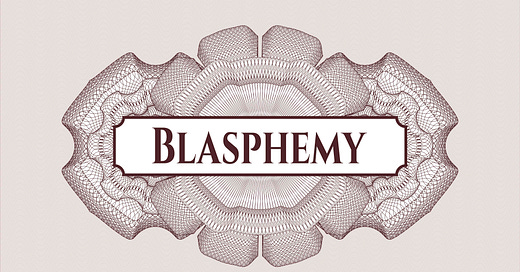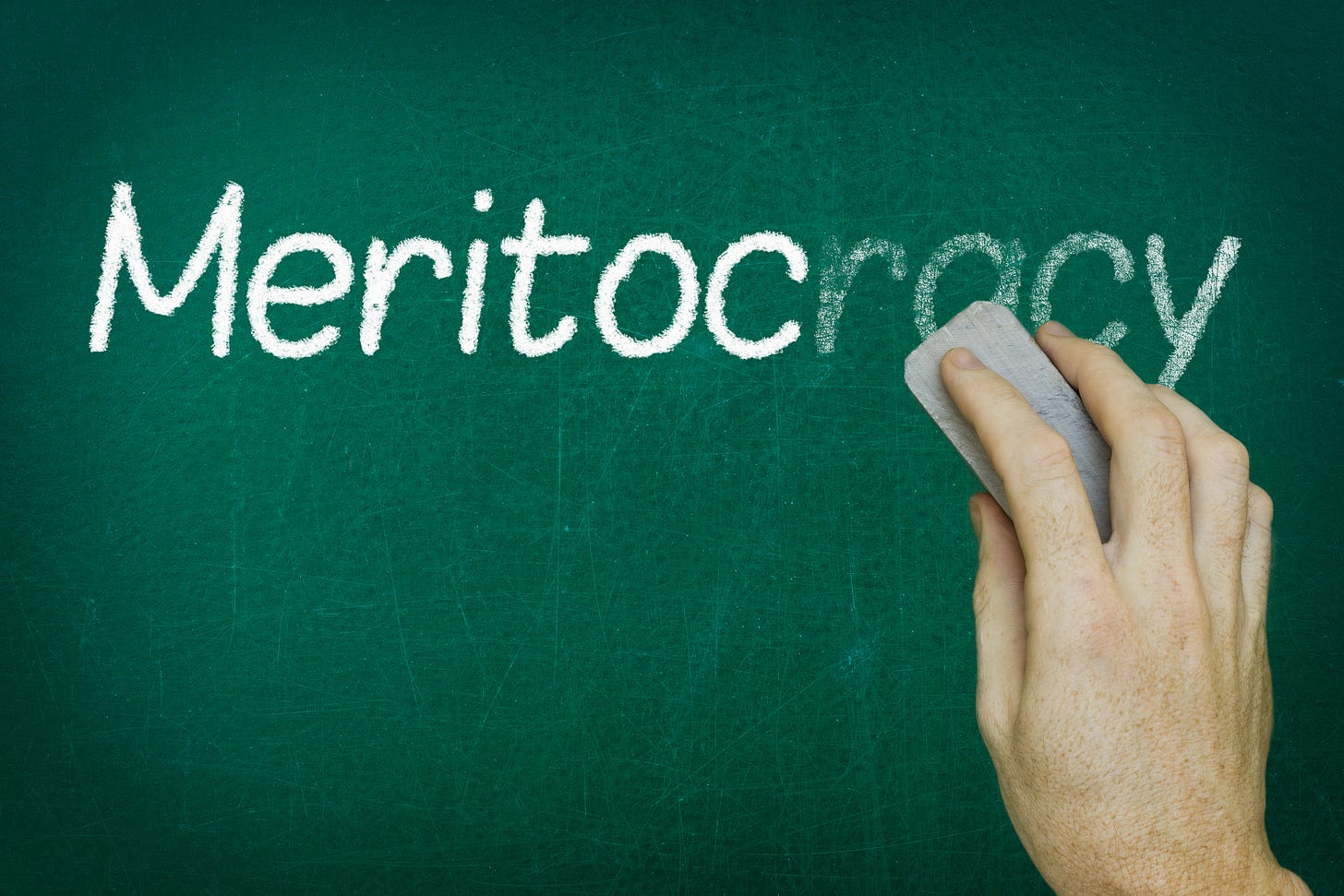E-Pluribus | June 28, 2021
Exposing Woke, Inc., the impact of equity on merit, and reinventing blasphemy in a secular age.
A round up of the latest and best writing and musings on the rise of illiberalism in the public discourse:
Tunku Varadarajan: Can Vivek Ramaswamy Put Wokeism Out of Business?
Vivek Ramaswamy, a multimillionaire who founded a biotech company at age 28, has written a book due out in August called Woke, Inc. Tunku Varadarajan writes at the Wall Street Journal that Ramaswamy takes aim at corporate America’s religion of wokeness with a vengeance. There is room for debate about some of Ramaswamy’s proposed solutions, but his insider perspective brings needed scrutiny to an elite group that wields an enormous amount of influence on social and political trends.
He describes this sort of corporate imposition—“a market force supplanting open political debate to settle the essence of political questions”—as one of the “defining challenges” America faces today. “If democracy means anything,” he adds, “it means living in a one-person-one-vote system, not a one-dollar-one-vote system.” Voters’ voices “are unadjusted by the number of dollars we wield in the marketplace.” Open debate in the public square is “our uniquely American mechanism” of settling political questions. He likens the woke-corporate silencing of debate as akin to the “old-world European model, where a small group of elites gets in a room and decides what’s good for everyone else.”
The wokeism-capitalism embrace, Mr. Ramaswamy says, was replicated in Silicon Valley. Over the past few years, “Big Tech effectively agreed to censor—or ‘moderate’—content that the woke movement didn’t like. But they didn’t do it for free.” In return, the left “agreed to look the other way when it comes to leaving Silicon Valley’s monopoly power intact.” This arrangement is “working out masterfully” for both sides.
The rest of corporate America appears to be following suit. “There’s a Big Pharma version, too,” Mr. Ramaswamy says. “Big Pharma had an epiphany in dealing with the left.” It couldn’t beat them, so it joined them. “Rather than win the debate on drug pricing, they decided to just change the subject instead. Who needs to win a debate if you can just avoid having it?” So we see “big-time pharma CEOs musing about topics like racial justice and environmentalism, and writing multibillion-dollar checks to fight climate change, while taking price hikes that they’d previously paused when the public was angry about drug pricing.”
Read the whole thing.
George F. Will: Attacking ‘merit’ in the name of ‘equity’ is a prescription for mediocrity
At The Washington Post, George Will examines the impact of a government-imposed standard of equity on the meritocracy that has long been an (imperfectly functioning) American ideal. However well-intentioned progressive goals of equity may be, talented individuals with much to offer society in pursuit of excellence bear an outsized burden of a system designed to produce equal outcomes.
“These days,” [Harvard’s Michael] Sandel writes, “we view success the way the Puritans viewed salvation — not as a matter of luck or grace, but as something we earn through our own effort and striving. This is the heart of the meritocratic ethic.” Sandel objects to this because “expansive conceptions of personal responsibility” ignore the fact that no one “deserves” his or her natural attributes.
Furthermore, the “rhetoric of responsibility” and of being “masters of our fate” obscures the degree to which even virtues conducive to thriving in a merit-based society — diligence, industriousness, self-reliance, deferral of gratification — are learned. They are largely inculcated in families, which are the primary transmitters of social capital — the habits necessary for taking advantage of the opportunities offered by an open society. By Sandel’s correct reckoning, families are sources of inequalities; by his incorrect reasoning, this is a problem in need of correction.
Sandel correctly says that often education, rather than propelling social mobility, reinforces family advantages. But should society regret families focusing on their children’s flourishing? Americans should think as Robert Frost did: “I am against a homogenized society because I want the cream to rise.”
Read it all at The Washington Post.
Lois McLatchie: In the West, ‘Incorrect’ Speech Is Increasingly Treated as Blasphemy
Lois McLatchie of the Alliance Defending Freedom UK writes at National Review that modern day efforts to police speech, even in the West, closely resemble blasphemy laws from the age where church and state were intertwined. Whether speech control has a secular or (ostensible) sacred motive, the chilling impact on the individual is equally pernicious.
[In Finland,] Päivi Räsänen — a grandmother, MP and former minister of the interior — is facing criminal prosecution over social-media comments. She didn’t criticize Islam, but she did challenge her own church — she asked them why they had decided to sponsor the Helsinki Pride Parade in 2019. It was enough to trigger a police investigation. Räsänen holds the biblical view that marriage is between a man and a woman, and said so in a pamphlet written for Christians in 2004, and as part of a radio interview in 2019. She is being prosecuted on three charges of “ethnic agitation” under a law that was passed after her pamphlet was published.
Europe’s “hate-speech laws” have taken the core principles of “blasphemy laws” and dressed them up in a watered-down Western packaging. Thoughts are now branded “unspeakable,” not for discussing deities, but dogma — even if that dogma is still widely held. The pope has been clear on his views on marriage. The Queen of England herself is head of a church that confesses the same view. Significant portions of European populations join them, amounting to one in five Brits, and one in four Fins. These are very significant minorities — but international legal standards on free speech protect their right to express their views, even if they amounted to fewer.
Räsänen’s experience won’t be the same as those prosecuted in South Asia. She certainly won’t languish on death row. Problems in Pakistan are undoubtedly more severe. But swapping out one type of unchallengeable “groupthink” for another, even with less jail time, makes a mockery of 21st-century democracy. At its core, silencing dialogue under “blasphemy” or “hate speech” laws is simply two sides of one authoritarian coin.
Read it all here.
Around Twitter
Click through for it all, but here are the first few tweets in a Glenn Greenwald thread about the latest group to run afoul of YouTube’s “Community Guidelines”: Right Wing Watch.




Beginning of a very long thread from Greg Lukianoff of the Foundation for Individual Rights in Education on anti-CRT legislation:


Jesse Singal on Jeffrey Sachs latest on anti-CRT legislation:


Thomas Chatterton Williams on a novel “transition” story:













